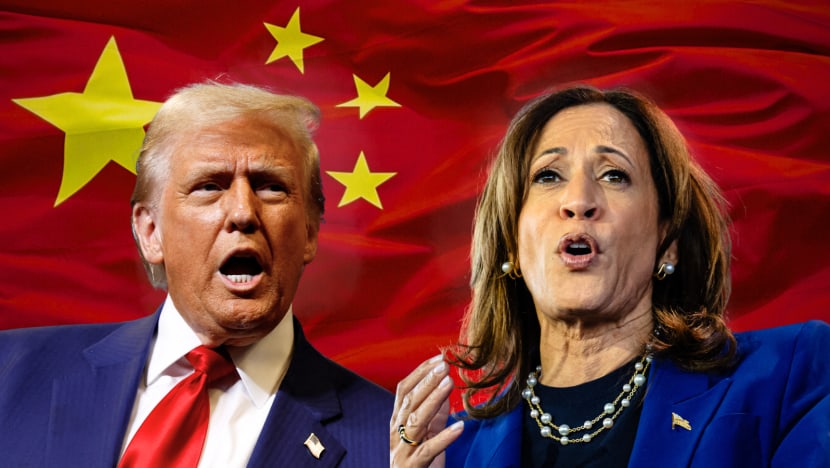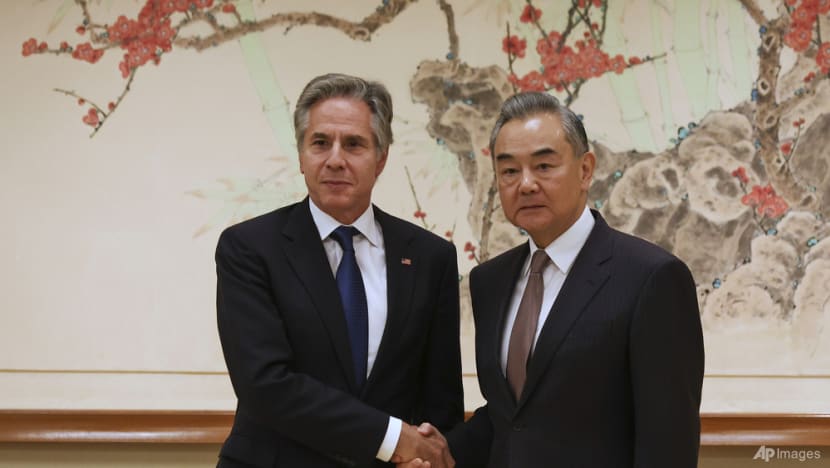As America votes for new president, what are the 3 Cs and 3 Ts that will define Sino-US ties?
Trade, tech and Taiwan loom large in the present Sino-US relationship. And how the next US president handles these issues will determine how much both sides will cooperate, compete or even confront each other, say analysts.

A composite illustration of US presidential candidates Donald Trump (left) and Kamala Harris. Analysts predict American policy towards China to stay tough regardless of the election outcome. (Photos: Getty Images via AFP/Anna Moneymaker & Jon Cherry)

This audio is generated by an AI tool.
SINGAPORE: A rocky road lies ahead for Sino-US ties regardless of who emerges as America's next leader, but the size of the rocks and which areas they lie in will vary depending on whether a Harris or Trump presidency emerges, say analysts.
They add that for all their disagreements, one thing both Republicans and Democrats agree on, even before the polarising and deadlocked presidential contest, is the need to counter China. This won’t change, whether it’s Vice-President Kamala Harris or former president Donald Trump who takes office.
Observers say this stance will colour Washington’s approach towards Beijing - a reality well recognised by the Chinese leadership.
“Strategic patience is Beijing's only choice in dealing with Washington, regardless of whether it's Trump or Harris,” Mr Einar Tangen, a senior fellow at the Beijing-based Taihe Institute, told CNA.
Trade, tech and Taiwan are the hot-button issues looming large over the bilateral relationship, with far-reaching global consequences depending on how they are handled, experts warn.
Dr William Choong, a senior fellow at ISEAS-Yusof Ishak Institute, told CNA that clarity on America’s China policies is a key want from Beijing.
“If the Chinese had their wish, they’d wish that all these trade curbs and tech export controls went away. But we know that's not going to go away,” he said.
COOPERATION, COMPETITION, CONFRONTATION
Competition and confrontation have been gaining ground in recent years, at the expense of cooperation in the Sino-US relationship. Competition, in particular, has effectively become a structural condition of their ties, say analysts.
A landmark Sino-US scientific cooperation treaty slipped away without renewal in late August for the first time in 45 years. Meanwhile, both sides have been locking horns on an expanding list of issues, centred on themes like national security.
Analysts expect this trend to persist regardless of a Harris or Trump win in the US presidential election. Americans head to the polls on Nov 5 to choose between Mr Trump, gunning for a second term, and Ms Harris, who replaced President Joe Biden on the Democratic Party ticket just over two months ago.
“(A Trump or Harris win is) two roads to the same cliff,” said Mr Tangen.
Similarly, Mr Steven Okun, senior advisor from the public affairs consultancy firm APAC Advisors, told CNA that whoever takes the Oval Office will not have “directional change” in China policy.
“US-China policy will be the same under either a Harris or Trump administration. There will be more tariffs and more investment restrictions,” he said.
Both presidential contenders have already made clear what they think about China.
“I will make sure … that America, not China, wins the competition for the 21st century,” pledged Ms Harris in late August when she accepted the Democratic nomination for the presidency.
Meanwhile, her Republican rival Mr Trump - who launched a trade war against China while in the White House from 2017 to 2021 - has vowed to get even tougher on China and “completely eliminate dependence” on the country of 1.4 billion people.
China is clear-eyed on this - and sees a Trump or Harris presidency as determining the degree of containment towards the world’s No 2 economy, said Dr Chen Dongxiao, a senior research fellow and president of the Shanghai Institutes for International Studies (SIIS), at a recent public lecture in Singapore.
Dr Chen highlighted that in the event of a Trump victory, he would have another four years in office without the pressure of re-election. Under American law, a US president can only serve two terms.
He explained that this would be of concern to China, as Mr Trump will have “more space and potential” to mobilise federal agencies in order to serve his “confrontational, anti-China containment policy and measures”.
China is not expected to publicly state or even allude to who it wants as America’s next leader, observers have noted, because it does not want to be accused of interference in the US election. Chinese officials have repeatedly stated the US presidential election is the Americans’ internal affair.
“They don’t have a vote. They do have a preference. But when they don’t get their preference, they have to work with whoever occupies the Oval Office in the White House,” said Dr Choong on Beijing’s perspective, based on his conversations with Chinese academics.
Professor Jia Qingguo, former dean of the School of International Studies at Peking University and a senior member of China’s top political advisory body, believes what matters is whether the incumbent or opposition party’s candidate comes up top, with the first scenario - in this case, a Harris presidency - being more beneficial for Beijing.
“The reason is in a presidential election, the opposition party would condemn or has to condemn the ruling party’s policies. When it comes to (policies on China), invariably … the opposition party candidate would condemn the ruling party for being too soft on China, and then they would vow to make some changes,” he explained at a recent conference in Singapore.
“When they get elected, they would have to honour some of their campaign promises - whether they are realistic or not - and (when trying to do so), the relationship would be in trouble,” he added.
Prof Jia also highlighted the potential for miscommunication during the presidential transition as some “tacit understandings” might not be passed on, potentially adding friction between the Chinese government and the new US administration.
In the US, a presidential transition is a formal process where a president-elect takes over the administration of the federal government from the incumbent president, giving the incoming leader and their team time to prepare for governance.
Conversely, a win by the incumbent party candidate - in this case, Ms Harris - would likely mean a smoother transition and some level of policy continuity - predictability that Beijing is likely to favour, he suggested.
Related:
TUSSLING OVER TRADE, TECH AND TAIWAN
Dr Choong said trade, tech and Taiwan are at the heart of US-China tensions - and how America’s next leader addresses these three issues, especially the last, determines not just the trajectory of bilateral ties, but whether competition and confrontation could boil over into conflict.
On trade, the US has been taking action to curb what it has described as unfair practices by China, hiking tariffs on Chinese imports ranging from steel to electric vehicles. Beijing has consistently denied the allegations and accused the US of trying to contain it.
A second Trump term would see tariffs taking pride of place in America’s economic policy, as the man himself has all but proclaimed.
“To me, the most beautiful word in the dictionary is ‘tariffs’,” Mr Trump said in an October interview with Bloomberg News. The businessman-turned-politician has signalled a 10 to 20 per cent blanket tariff on all imports under his watch, with the rate upwards of 60 per cent on goods from China.
Some tariff measures under the Biden administration were carried forward from the first Trump term.
Should she win the election, Ms Harris is likely to retain many of these elements, including targeted tariffs as well as working with partners and allies from a military security perspective, noted Mr Okun, who served in the Bill Clinton administration.
While China would obviously like to see US tariffs gone, it’s resigned to the fact they will remain in some shape or form beyond the Nov 5 poll, said Dr Choong, who is also the managing editor of the ISEAS-Yusof Ishak Institute's Fulcrum commentary website.
Tech is another sticking point in Sino-US relations.
The Biden administration has kept up what it has termed a “small yard, high fence” approach to restrict Chinese access to key technologies, for reasons of national security.
“Small yard” refers to a small group of technologies and research deemed critical to US national security, while “high fence” signifies strict containment measures on them. This strategy leaves room for engagement with China beyond this perimeter.
But observers have pointed out that the yard has been growing bigger and the fence getting higher.
“(The measures) now include export controls, inward and outbound investment controls, and vendor monitoring and reporting obligations that cover a growing list of technologies,” Mr John Lee, the director of consultancy East West Futures and a researcher at the Leiden Asia Centre, noted in a February article.
On Oct 28, US officials announced new rules, banning US-headquartered firms, citizens, and permanent residents from investing in Chinese technology like semiconductors, artificial intelligence and quantum computing, with effect from Jan 2 next year.
Dr Choong shared that based on his conversations with the Chinese, many see the expanding measures as a new reality. What they seek is clarity on the exact scope of the policy so as to work around it, he noted.
“(The Chinese) are saying: ‘We don’t care if it’s going to be a small yard or big yard. Just tell us what the boundaries of the yard actually are.’ I think that’s a pretty reasonable request,” he said.
Related:
Then there’s Taiwan, the self-ruled island China considers an inalienable part of its territory.
Beijing has repeatedly underscored it will not tolerate any internal or external attempts towards Taiwan independence. Chinese President Xi Jinping has framed the issue as “the bedrock of the political foundation of China-US relations”, and the “first red line” that must not be crossed in bilateral ties.
Cross-strait tensions are at their highest in recent years. Chinese military sorties around the self-ruled island have become a near-daily occurrence. Major drills just last month simulated a blockade and assaults on “maritime and ground targets”.
The US has long followed a policy of strategic ambiguity regarding Taiwan, being intentionally vague about how it would support Taiwan should China attempt a takeover.
This has provided space for future resolution of the issue, Mr Okun observed.
“There has been no indication that any of the three parties (the US, China, and Taiwan) are looking for an immediate change to the status quo within the US-China bilateral relationship from their respective positions,” he added.
On broader security issues, including that of Taiwan, Dr Choong noted that a Harris presidency would continue emphasising alliances and partnerships to deter China.
“This will also continue to irritate China to no end, simply because the Chinese feel that they are being hemmed in,” he said.
In contrast, for a Trump 2.0 presidency, Dr Choong sees a "big question mark", saying that the former president has a “short attention span”.
Mr Trump has made several comments on the campaign trail that Taiwan should pay to be protected, and accused the island of stealing US semiconductor business.
“Some of the comments made on Taiwan, whether it's actually worth the candle on (the island), who knows? It really depends on the day or the month that we are raising that question,” remarked Dr Choong.
REGIONAL RIPPLES
Whichever way the chips fall in the race for the White House, analysts say Southeast Asia will feel the ripples considering the region’s strategic importance in the US-China rivalry.
Should Mr Trump emerge victorious and make good on his tariff threat, aside from hurting American consumers and businesses, the international economy would be roiled as other countries retaliate, the non-partisan US think tank Peterson Institute for International Economics warned in June.
This would result in a global decline cutting across resource, manufacturing and financial centres, said Mr Tangen from Taihe Institute.
In particular, trading nations like Singapore and those which have large trade surpluses with the US, like Malaysia and Vietnam, should brace for economic pain under a second Trump administration, noted Mr Okun from APAC Advisors.
“Those countries should prepare for tariffs to be clapped upon them, regardless of their importance to the US in terms of China,” he said.
Mr Trump has a “short attention span” and has limited patience for specific policy details, Dr Choong said. “That's the larger problem for people in this region who want an administration that thinks through carefully about its policies towards this region.”
When it comes to a Harris presidency, analysts agree that the regional implications would be relatively less acute as she is unlikely to veer from the policies set by her current boss.
A Harris administration will fundamentally keep up Mr Biden’s approach of working with partners and allies to advance American national interests in the region and forge a multilateral rules-based order, Mr Okun said.
Be it Ms Harris or Mr Trump, America’s regional strategy could face turbulence, analysts warn.
Dr Choong said there have been observations of a decline in Southeast Asia experts in Washington, which may signal a “systemic problem” in tailoring appropriate policies for the region.
FOR THE US, “PERSONNEL IS POLICY”
Be it a Trump or Harris presidency, analysts point out that their respective administration members will have a major hand in shaping policies.
“More so for the US than most governments, personnel is policy,” said Mr Okun from APAC Advisors. He explained that while the White House determines the overall direction, presidential appointees have “large sway” in determining administration policy due to a hefty government that’s involved in “nearly every global issue”.
In terms of Washington’s policies towards Beijing, key positions to look out for are secretary of state, treasury secretary, the US trade representative and national security advisor, Mr Okun said.
For example, current Secretary of State Blinken has been at the forefront of Sino-US engagements, making two visits to Beijing in the past two years and meeting top Chinese leaders, including President Xi. Treasury Secretary Janet Yellen has similarly made trips to China to express concerns over overcapacity.
While neither Mr Trump nor Ms Harris has explicitly stated their cabinet lineup should they take the Oval Office, potential picks have already surfaced in the lead-up. Both sides have also hinted at a baseline criteria.
A senior official in Trump’s campaign told the Financial Times early last month that any appointees to a second Trump administration would need to prove “fidelity and loyalty”. Meanwhile, continuity aside, Ms Harris is also looking towards a younger, more diverse lineup, US media outlet Politico has reported.
Mr Okun believes Trump will prioritise appointees who are loyal to him if he gets a second stint in the Oval Office. Consequently, these loyalists are more likely to back his more aggressive stance against China.
“His national security team could range from being hawkish in China within the existing relationship to one that could push for a further decoupling of the two economies,” he said.

For China, the landscape is considerably different. While Foreign Minister Wang Yi has been the leading diplomat on the frontline, power is effectively centralised around Mr Xi as the core of the leadership, observers note.
Mr Wang became the country’s top diplomat in January last year when he was appointed as the director of the Office of the Central Foreign Affairs Commission of China’s Communist Party (CCP).
At the same time, the work of policymaking is done by think tanks and government commissions that assess the landscape and make recommendations, shared Mr Tangen from Taihe Institute.
“(President Xi) is credited with the strategy, but the policies are the result of hundreds of thousands of hours of study and debate … in contrast to many developed nations where policies are based on the political winds,” Mr Tangen remarked, without specifying which countries he was referring to.
He added that at the end of the day, both China and the US need to understand that mutual cooperation is the best way forward - the challenge is making sure both sides are aligned in mindset and execution.
Mr Tangen referenced the Prisoner’s Dilemma, a thought experiment where two parties are separated and unable to communicate. One side benefits if it betrays the other, but working together can yield better collective results.
“China and the US are not the only actors in the world, but as the leading economies they have a duty to learn and accept their differences and work together towards a shared future, not one that prioritises one above all,” he said.





















